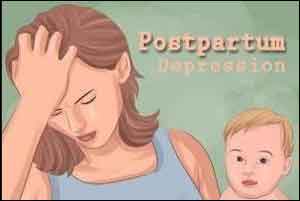- Home
- Editorial
- News
- Practice Guidelines
- Anesthesiology Guidelines
- Cancer Guidelines
- Cardiac Sciences Guidelines
- Critical Care Guidelines
- Dentistry Guidelines
- Dermatology Guidelines
- Diabetes and Endo Guidelines
- Diagnostics Guidelines
- ENT Guidelines
- Featured Practice Guidelines
- Gastroenterology Guidelines
- Geriatrics Guidelines
- Medicine Guidelines
- Nephrology Guidelines
- Neurosciences Guidelines
- Obs and Gynae Guidelines
- Ophthalmology Guidelines
- Orthopaedics Guidelines
- Paediatrics Guidelines
- Psychiatry Guidelines
- Pulmonology Guidelines
- Radiology Guidelines
- Surgery Guidelines
- Urology Guidelines
Brexanolone first-ever drug to be approved for Postpartum Depression

Postpartum depression (PPD) is a readily identified major depressive disorder that is the most common medical complication of childbirth, affecting a subset of women typically commencing in the third trimester of pregnancy or within four weeks after giving birth.It is a serious mental health disorder that negatively impacts all members of a family and for which there are no approved therapies.There is currently no FDA approved treatment for PPD. Using the Pregnancy Risk Assessment Monitoring System (PRAMS), the Centers for Disease Control and Prevention (CDC) found that the rate of women who experience PPD is around 1 in 9. The new drug may fulfill the unmet need in the treatment of postpartum depression.
Sage Therapeutics(NASDAQ: SAGE), a clinical-stage biopharmaceutical company developing novel medicines to treat life-altering central nervous system (CNS) disorders,has announced that the Company has submitted a New Drug Application (NDA) to the U.S. Food and Drug Administration (FDA) for its lead product candidate, an intravenous formulation of brexanolone (SAGE-547), for the treatment of postpartum depression (PPD).
Brexanolone is a proprietary allosteric modulator of both synaptic and extrasynaptic GABAA receptors. The NDA is supported by 3 multicenter, randomized, double-blind, placebo-controlled trials(Study 202A, Study 202B, and Study 202C) in women with moderate to severe PPD who were screened ≤6 months after giving birth.
Results in the 202B and 202C trials showed that brexanolone achieved the primary endpoint of mean reduction from baseline in the Hamilton Rating Scale for Depression (HAM-D) compared with placebo at 60 hours (Study 202B: P=.0242 for 90µg/kg/h dose and P=.0011 for 60µg/kg/h dose; Study 202C: P=.0160 for 90µg/kg/h dose). The effect observed at 60 hours in the brexanolone groups was maintained through the 30-day follow-up.There were no deaths, serious adverse events, or discontinuations due to adverse events reported in either treatment group.
Brexanolone has been granted Breakthrough Therapy designation by the FDA in September 2016 and Priority Medicines (PRIME) designation from the European Medicines Agency (EMA), underscoring the significant unmet need in women suffering from postpartum depression.It is going to be the first-ever drug approved specifically for PPD, which affects some 10 to 20 percent of women giving birth every year in the U.S.

Disclaimer: This site is primarily intended for healthcare professionals. Any content/information on this website does not replace the advice of medical and/or health professionals and should not be construed as medical/diagnostic advice/endorsement or prescription. Use of this site is subject to our terms of use, privacy policy, advertisement policy. © 2020 Minerva Medical Treatment Pvt Ltd